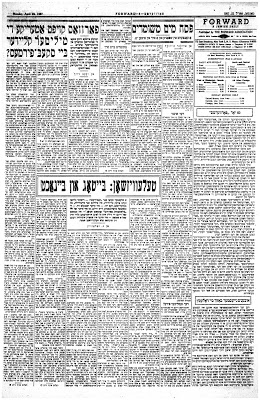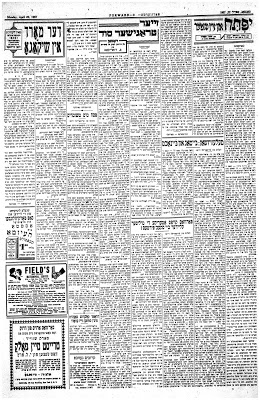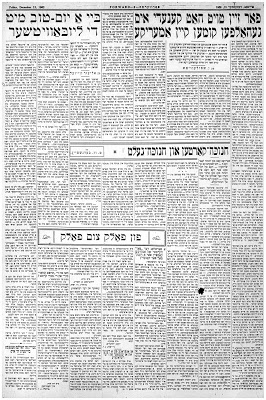At a Holiday Celebration with the Lubavitchers by Elie Wiesel (1963)
At a Holiday Celebration with the Lubavitchers [on Yud Tes Kislev]
By Eliezer Wiesel
The Forverts (13 December 1963) [Yiddish]
[Translated to English by Shaul Seidler-Feller (2017)]
The “Holiday of Salvation” among the Lubavitchers. – We travel to Brooklyn the way they used to travel to see the rebbe. – The holiday of Yud Tes Kislev. – Why I like to attend when the Lubavitchers host a farbrengen. – Guests from Israel. – The miracle of joy.
By Eliezer Wiesel
Someone remembered: it is Yud Tes Kislev. So, who wants to visit the Lubavitchers? Everyone. Everyone wants to go. Just because? [No,] it is the Holiday of Salvation. The first rebbe, Rabbi Shneur Zalman of Lyady, the Ba‘al ha-Tanya, was released from a tsarist prison on the nineteenth day of Kislev. The joy [of that moment] has remained in its entirety, being passed on from generation to generation, from heart to heart, from word to word. Who says that only sorrow must be bequeathed as an inheritance? Hasidim do not believe in such an inheritance. Hasidim move heaven and earth to stay happy. The Imminent Presence of God is driven away by sadness.
Ten people were gathered in the room, both locals and visitors from the State of Israel: Aryeh Disenchik, editor-in-chief of the Tel Aviv-based evening newspaper Maariv; Aharon Kidan, one of Prime Minister Levi Eshkol’s closest assistants; Yehuda Hellman, secretary of the Conference of Presidents; the Israeli author Zvi Kolitz (one of the producers of the anti-Pius play The Deputy); and Isaac Moyal, representative of Keren Hayesod.
We were speaking, as usual, about politics and acquaintances: where so-and-so is and what became of so-and-so. Also: what will be the nature of the relationship between the Johnson Administration and Israel? Or: has Levi Eshkol yet freed himself entirely of the famous shepherd in Sde Boker?
Close to midnight, someone remarked: it is Yud Tes Kislev. The effect was instantaneous. The heated discussions were cut short. No one spoke for a full minute. Presumably everyone was remembering his own Holiday of Salvation, his own personal thirst for redemption.
Who wants to visit the Lubavitchers?
Everyone. Almost without exception. Just like once upon a time in Hungary or Poland: they would travel to the rebbe to liberate themselves from the mundane; to forget their gray, daily concerns; to immerse themselves in Hasidic rapture and Hasidic song, if not in Hasidic faith.
I enjoy Lubavitcher celebrations. I enjoy watching Jews rejoicing and tearing themselves away from the earth, as if it had no control over them, as if their enemies had lost their power, if not forever, then at least for now, on this night of remembrance and thanksgiving.
The rebbe, Rabbi Menachem Mendel Schneersohn, sits up front and toasts “l’chaim!” before the hundreds of Hasidim and yeshivah students, who sway while singing and close their eyes while listening to his homily.
I first attended such a farbrengen four years ago – and whoever comes once must return.
Jews have so many reasons to mourn and to allow themselves to sink into melancholy. So when I see a congregation building the palace of song, I feel like reciting a blessing: she-heheyyanu.
Since the War, I have felt that we will never again be able to sing and forget. The Holy Temple was destroyed more than once in sinful Europe, and Tish‘ah be-Av, I thought, would fall more than once a year.
Never again will yeshivah students clap their hands to the rhythm of a melody; never again will their faces flare up under the radiant, calm gaze of their rebbe – so I thought both during and after the War. The world will remain a cemetery, without Kohanim and without Levites.
That is why I come to the Lubavitchers. Their jubilation attracts me. Since the Holocaust, every bit of joy is – a miracle, even greater than the release of the rabbi from Lyady.
Isaac Babel writes in one of his novels that he once had the opportunity to meet the Chernobyler Rebbe of that time. Involuntarily, a cry of pain escaped the Soviet Jewish writer’s heart: “Rebbe! Bless me! Give me rapture!”
That same cry of pain or prayer of pain rages within all of us. Most of us unfortunately have no one to cry to, to pray to, and we live in a desolate world. Our life force thirsts for a sip of water – but everything around us is dry, silent. There is no strength to sing, no reason to sing. The past went up in flames, the future is shrouded in heavy clouds. Not long ago, a friend of mine confided in me that he had just gotten married, but he has not yet decided if he can bring children into the world, whether he has the right to do so. Because – what can he offer his children? Just dangers and memories, both of them exceedingly dreadful.
That is why I enjoy going to the Lubavitchers, even though I am a Vizhnitser, not a Lubavitcher, Hasid.
Among them – one wishes to say: among us – they know how to banish doubt and melancholy. They know the secret of joy and rapture. The world will always remain the world, man will always remain man: if you have a difficult question, open the Tanya and learn a chapter; or: raise your cup and have the rebbe toast you “l’chaim!” – and your soul will feel relieved.
The rebbe says his Torah, the crowd sings. A bridge connects Torah and song, and on it Hasid and rebbe meet, one drawing his strength from the other.
Dozens of paper cups are lifted into the air, all of them directed toward the rebbe; no one will drink without his “l’chaim!” signal.
Here, inside, everything is clear. Without confusion. There is a path, and the rebbe knows where it leads. Liberation is a miracle that is renewed every day. Every one of us has something from which to free himself and an enemy to conquer.
Outside, that path becomes a forest where shadows stray, searching for light in others’ windows.
I cast a glance at my friends who have come from both near and far to this holiday celebration. The scene before their eyes has captivated and enchanted them. When someone leads them up to the rebbe, they are the happiest people in the world. One after the other, they shake his hand and ask for his blessing. Yud Tes Kislev will become a date in their lives, too.
On our way out, someone remarked: I had no idea that despite the fact that I am not a Hasid I would not feel like a stranger among them. That is the miracle.
Somewhere in the east, on the edge of the horizon, a ray of light has brought the promise of a new beginning.


